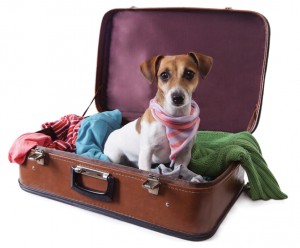AVMA Influence is Apparent in New DOT Final Rule on Traveling by Air with Service Animals
 The U.S. Department of Transportation (DOT) has issued a final rule that amends regulations under the Air Carrier Access Act, defining a service animal as a dog that has been trained to do work or perform tasks for the benefit of an individual with a disability (to include a physical, sensory, psychiatric, intellectual or other mental disability) and allowing airlines to recognize emotional support animals (ESA) as pets, rather than as service animals. U.S. airlines, which were previously required to accommodate emotional support animals on flights, will no longer be required to do so.
The U.S. Department of Transportation (DOT) has issued a final rule that amends regulations under the Air Carrier Access Act, defining a service animal as a dog that has been trained to do work or perform tasks for the benefit of an individual with a disability (to include a physical, sensory, psychiatric, intellectual or other mental disability) and allowing airlines to recognize emotional support animals (ESA) as pets, rather than as service animals. U.S. airlines, which were previously required to accommodate emotional support animals on flights, will no longer be required to do so.
The final rule also allows airlines to require passengers with a disability traveling with a service animal to complete and submit a form, developed by the DOT, attesting to the animal’s training and good behavior, and certifying the animal’s good health. For flights of eight hours or more, the rule allows airlines to require passengers to submit a DOT form attesting that the animal has the ability either not to relieve itself on a long flight or to relieve itself in a sanitary manner.
In drafting the rule, the DOT cited a dramatic increase in passengers flying with emotional support animals, which has resulted in an influx of untrained or undertrained animals causing incidents during travel.
The AVMA was highly engaged on behalf of the veterinary profession as the rule was being developed and finalized. Recognizing that collaboration with other stakeholders was critical to success, in 2018, the AVMA convened a roundtable with representatives from the major airlines, their member association, and the DOT, and in 2018-2019 hosted a working group that included individuals and organizations experienced in the use and training of service and assistance animals. Subsequently, the AVMA submitted several rounds of comments based on feedback from its members and its subject matter expert volunteers.
In its comments, the AVMA indicated that, because ESAs do not share the same training and deliberate acclimation to various environments and situations as do service dogs, they may present a risk to other passengers, other animals, and even themselves in airline cabins. Accordingly, the AVMA expressed its agreement with the DOT proposal to allow airlines to recognize ESA as pets, rather than as service animals.
In addition, the AVMA raised concerns with the DOT about the forms airlines require as documentation for emotional support animals, which vary across airlines and require veterinarians to attest to the animal’s anticipated behavior on an airline flight. The AVMA explained that veterinarians cannot guarantee the behavior of an animal—especially in a novel environment like an aircraft—and emphasized that veterinarians might refuse to complete and sign such forms if they were expanded beyond the scope of health and behavior that could be assessed during the course of a veterinary examination.
The final rule offers a standard Air Transportation Form, developed by the DOT, and no longer requires veterinarians to complete and sign the form. The rule also includes a requirement that service dogs traveling in the cabin have a current vaccination against rabies, which the AVMA also recommended to protect both animal and public health.
“We are incredibly pleased that the AVMA’s expertise and input are reflected in this new rule,” said AVMA President Douglas Kratt, DVM. “We applaud the DOT for taking action. It’s a success story for the veterinary profession, animal welfare, those with disabilities who need support from well-trained service animals, and other members of the air traveling public. Veterinarians have been struggling for years with requests from pet owners and requirements from airlines, and the new rule with its standardized documentation and clear guidance will help eliminate confusion. It’s another great example of the collective strength of the AVMA in supporting its members and protecting the health and welfare of animals.”
The final rule on “Traveling by Air with Service Animals” can be found on the DOT website and will take effect 30 days after its publication in the Federal Register.
Short URL: https://caninechronicle.com/?p=194538
Comments are closed












